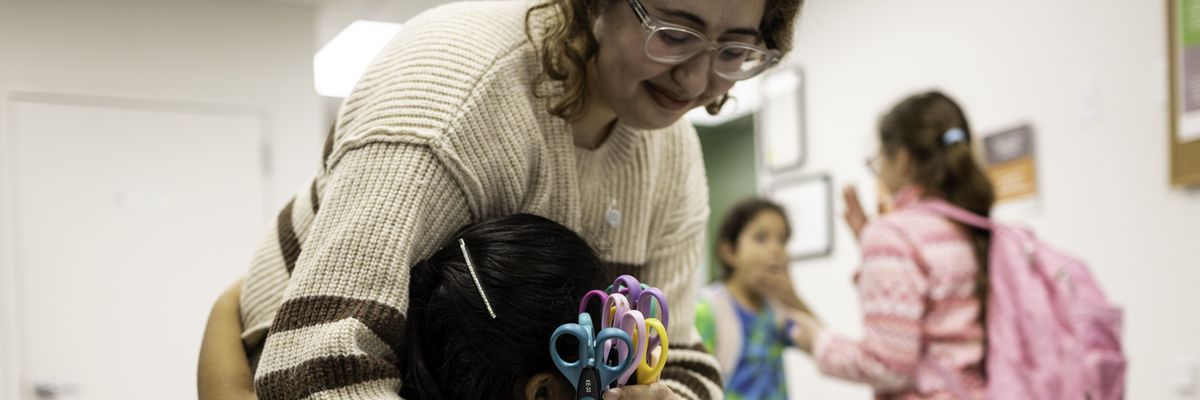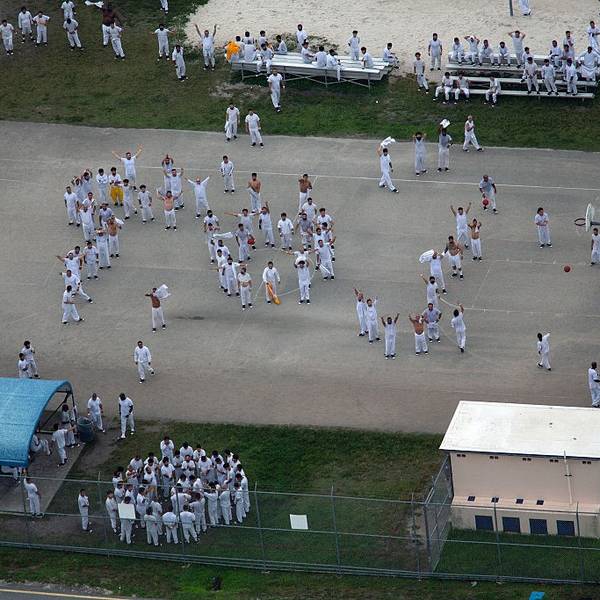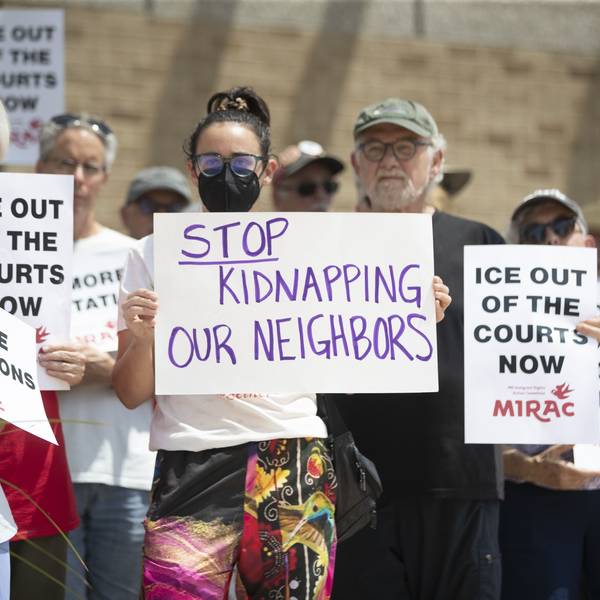
A child of immigrants hugs a teacher following "homework club" at a community center on April 3, 2025 at an undisclosed location in Connecticut. Many immigrants, including legal green card holders, have expressed extreme anxiety as the Trump administration wages its mass deportation campaign.
Trump Deportation Campaign Forcing Immigrants to Avoid Healthcare and Change Daily Routines
“We are grateful for everything this country has given us and our children,” said one man. “But the system has become downright cruel toward immigrants.”
For people who have immigrated to the United States—regardless of whether they have legal status—life under the second Trump administration has provoked daily anxiety and fear—forcing many to make choices about whether it's safe to go to church services that once provided a sense of community, seek medical care, and send their children to school.
As federal immigration agents continued raiding communities in Charlotte, North Carolina—the latest target of the administration's mass deportation campaign—as well as other cities across the US, the New York Times/KFF poll released Tuesday gave a comprehensive look at how President Donald Trump's anti-immigration policies have impacted both undocumented immigrants and people who have green cards and other legal documentation.
Nearly 80% of undocumented immigrants reported negative health impacts due to worries about being deported, separated from their families, or otherwise harmed due to their immigration status.
Health impacts they reported include problems sleeping or eating, worsening health conditions such as high blood pressure and diabetes, and worsening anxiety or stress.
Immigrants with legal documentation also reported these impacts in large numbers, with 47% saying they have experienced health issues stemming from worries about Trump's policies. Nearly a third of naturalized citizens said the same.
A 34-year-old Colombian woman in New York said her family is "scared of going out."
“We’re getting depressed," she said. "We’re scared that they’ll separate us, they’ll mistreat us.”
While experiencing increased negative health impacts, immigrants have become more likely to avoid getting medical care—as viral videos have shown US Immigration and Customs Enforcement (ICE) agents making arrests at medical offices.
Under the Biden administration, ICE and other federal agents were barred from conducting immigration enforcement at sensitive locations like schools and hospitals, but Trump rescinded those limits.
Between 2023-25, the share of adult immigrants who reported skipping or delaying healthcare increased from 22% to 29%. One in five said it was due to immigration-related worries.
Nearly a third of parents also said they had delayed or avoided medical appointments for their children; the share rose to 43% for undocumented immigrant parents.
About half of all adult immigrants and nearly 80% of undocumented immigrants said they were "somewhat" or "very" concerned about healthcare providers sharing information with immigration enforcement officials.
Two years ago, about 26% of immigrants reported fears that they or a family member could be deported or detained, and that number has jumped to 41%.
One-third of noncitizen immigrants said they have begun avoiding aspects of everyday life, and nearly 60% of undocumented immigrants said the same.
"We have been the workforce in construction, restaurants, janitorial,” Ana Luna, an immigrant who has lived in Los Angeles with her family for nearly two decades, told the Times. “Now we have to run, hide, or stay inside. And it’s especially heartbreaking for our children.”
Luna told the Times that her youngest child's school had recently informed her that immigration enforcement was nearby.
“We are grateful for everything this country has given us and our children,” her husband, Gabriel Lorenzo, told the Times. “But the system has become downright cruel toward immigrants.”
An Urgent Message From Our Co-Founder
Dear Common Dreams reader, The U.S. is on a fast track to authoritarianism like nothing I've ever seen. Meanwhile, corporate news outlets are utterly capitulating to Trump, twisting their coverage to avoid drawing his ire while lining up to stuff cash in his pockets. That's why I believe that Common Dreams is doing the best and most consequential reporting that we've ever done. Our small but mighty team is a progressive reporting powerhouse, covering the news every day that the corporate media never will. Our mission has always been simple: To inform. To inspire. And to ignite change for the common good. Now here's the key piece that I want all our readers to understand: None of this would be possible without your financial support. That's not just some fundraising cliche. It's the absolute and literal truth. We don't accept corporate advertising and never will. We don't have a paywall because we don't think people should be blocked from critical news based on their ability to pay. Everything we do is funded by the donations of readers like you. Will you donate now to help power the nonprofit, independent reporting of Common Dreams? Thank you for being a vital member of our community. Together, we can keep independent journalism alive when it’s needed most. - Craig Brown, Co-founder |
For people who have immigrated to the United States—regardless of whether they have legal status—life under the second Trump administration has provoked daily anxiety and fear—forcing many to make choices about whether it's safe to go to church services that once provided a sense of community, seek medical care, and send their children to school.
As federal immigration agents continued raiding communities in Charlotte, North Carolina—the latest target of the administration's mass deportation campaign—as well as other cities across the US, the New York Times/KFF poll released Tuesday gave a comprehensive look at how President Donald Trump's anti-immigration policies have impacted both undocumented immigrants and people who have green cards and other legal documentation.
Nearly 80% of undocumented immigrants reported negative health impacts due to worries about being deported, separated from their families, or otherwise harmed due to their immigration status.
Health impacts they reported include problems sleeping or eating, worsening health conditions such as high blood pressure and diabetes, and worsening anxiety or stress.
Immigrants with legal documentation also reported these impacts in large numbers, with 47% saying they have experienced health issues stemming from worries about Trump's policies. Nearly a third of naturalized citizens said the same.
A 34-year-old Colombian woman in New York said her family is "scared of going out."
“We’re getting depressed," she said. "We’re scared that they’ll separate us, they’ll mistreat us.”
While experiencing increased negative health impacts, immigrants have become more likely to avoid getting medical care—as viral videos have shown US Immigration and Customs Enforcement (ICE) agents making arrests at medical offices.
Under the Biden administration, ICE and other federal agents were barred from conducting immigration enforcement at sensitive locations like schools and hospitals, but Trump rescinded those limits.
Between 2023-25, the share of adult immigrants who reported skipping or delaying healthcare increased from 22% to 29%. One in five said it was due to immigration-related worries.
Nearly a third of parents also said they had delayed or avoided medical appointments for their children; the share rose to 43% for undocumented immigrant parents.
About half of all adult immigrants and nearly 80% of undocumented immigrants said they were "somewhat" or "very" concerned about healthcare providers sharing information with immigration enforcement officials.
Two years ago, about 26% of immigrants reported fears that they or a family member could be deported or detained, and that number has jumped to 41%.
One-third of noncitizen immigrants said they have begun avoiding aspects of everyday life, and nearly 60% of undocumented immigrants said the same.
"We have been the workforce in construction, restaurants, janitorial,” Ana Luna, an immigrant who has lived in Los Angeles with her family for nearly two decades, told the Times. “Now we have to run, hide, or stay inside. And it’s especially heartbreaking for our children.”
Luna told the Times that her youngest child's school had recently informed her that immigration enforcement was nearby.
“We are grateful for everything this country has given us and our children,” her husband, Gabriel Lorenzo, told the Times. “But the system has become downright cruel toward immigrants.”
For people who have immigrated to the United States—regardless of whether they have legal status—life under the second Trump administration has provoked daily anxiety and fear—forcing many to make choices about whether it's safe to go to church services that once provided a sense of community, seek medical care, and send their children to school.
As federal immigration agents continued raiding communities in Charlotte, North Carolina—the latest target of the administration's mass deportation campaign—as well as other cities across the US, the New York Times/KFF poll released Tuesday gave a comprehensive look at how President Donald Trump's anti-immigration policies have impacted both undocumented immigrants and people who have green cards and other legal documentation.
Nearly 80% of undocumented immigrants reported negative health impacts due to worries about being deported, separated from their families, or otherwise harmed due to their immigration status.
Health impacts they reported include problems sleeping or eating, worsening health conditions such as high blood pressure and diabetes, and worsening anxiety or stress.
Immigrants with legal documentation also reported these impacts in large numbers, with 47% saying they have experienced health issues stemming from worries about Trump's policies. Nearly a third of naturalized citizens said the same.
A 34-year-old Colombian woman in New York said her family is "scared of going out."
“We’re getting depressed," she said. "We’re scared that they’ll separate us, they’ll mistreat us.”
While experiencing increased negative health impacts, immigrants have become more likely to avoid getting medical care—as viral videos have shown US Immigration and Customs Enforcement (ICE) agents making arrests at medical offices.
Under the Biden administration, ICE and other federal agents were barred from conducting immigration enforcement at sensitive locations like schools and hospitals, but Trump rescinded those limits.
Between 2023-25, the share of adult immigrants who reported skipping or delaying healthcare increased from 22% to 29%. One in five said it was due to immigration-related worries.
Nearly a third of parents also said they had delayed or avoided medical appointments for their children; the share rose to 43% for undocumented immigrant parents.
About half of all adult immigrants and nearly 80% of undocumented immigrants said they were "somewhat" or "very" concerned about healthcare providers sharing information with immigration enforcement officials.
Two years ago, about 26% of immigrants reported fears that they or a family member could be deported or detained, and that number has jumped to 41%.
One-third of noncitizen immigrants said they have begun avoiding aspects of everyday life, and nearly 60% of undocumented immigrants said the same.
"We have been the workforce in construction, restaurants, janitorial,” Ana Luna, an immigrant who has lived in Los Angeles with her family for nearly two decades, told the Times. “Now we have to run, hide, or stay inside. And it’s especially heartbreaking for our children.”
Luna told the Times that her youngest child's school had recently informed her that immigration enforcement was nearby.
“We are grateful for everything this country has given us and our children,” her husband, Gabriel Lorenzo, told the Times. “But the system has become downright cruel toward immigrants.”

